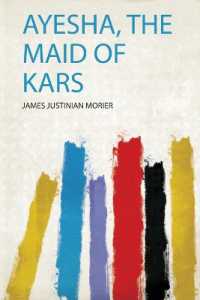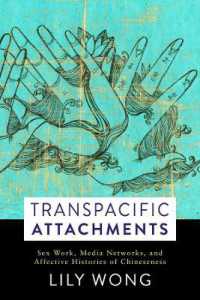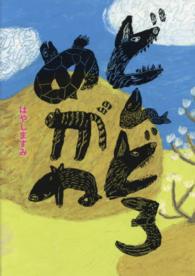- ホーム
- > 洋書
- > 英文書
- > Literary Criticism
Full Description
With thirty-nine original chapters from internationally prominent scholars, The Oxford Handbook of Virginia Woolf is designed for scholars and graduate students. Feminist to the core, each chapter examines an aspect of Woolf's achievement and legacy. Each contribution offers an overview that is at once fresh and thoroughly grounded in prior scholarship. Six sections focus on Woolf's life, her texts, her experiments, her life as a professional, her contexts, and her afterlife. Opening chapters on Woolf's life address the powerful influences of family, friends, and home. The section on her works moves chronologically, emphasizing Woolf's practice of writing essays and reviews alongside her fiction. Chapters on Woolf's experimentalism pay special attention to the literariness of Woolf's writing, with opportunity to trace its distinctive watermark while 'Professions of Writing', invites readers to consider how Woolf worked in cultural fields including and extending beyond the Hogarth Press and the TLS. The 'Contexts' section moves beyond writing to depict her engagement with the natural world as well as the political, artistic, and popular culture of her time. The final section on afterlives demonstrates the many ways Woolf's reputation continues to grow, across the globe, and across media, in ideas and in artistic expression. Of particular note, chapters explore three distinct Woolfian traditions in fiction: the novel of manners, magical realism, and the feminist novel.
Contents
Part I: Life
1: Urmila Seshagiri: Family and Place
2: Kathryn Simpson: Friends and Lovers
3: Regina Marler: Traditions and Transformations
Part II: Texts
4: Caroline Pollentier: Private Writings
5: Jocelyn Rodal: Early Novels and Stories (1915-1923)
6: Gabrielle McIntire: Mature Works I (1924-1927)
7: Elsa Högberg: Mature Works II (1928-1932)
8: Alice Wood: Late Works (1933-1941)
Part III: Experiments in Form and Style
9: Dora Zhang: Stream of Consciousness
10: Amy Bromley: Character, Form, and Fiction
11: Jesse Matz: Time
12: Janine Utell: Narrative Ethics
13: Jane de Gay: Allusion and Metaphor
14: Laura Marcus: Biography and Autobiography
Part IV: Professions of Writing
15: Helen Southworth: Literary London
16: Alice Staveley: The Hogarth Press
17: Eleanor McNees: Woolf as Reviewer-Critic
18: Beth C. Rosenberg: The Essays
19: Claire Davison: The Lyrical Mode of Translating
Part V: Contexts
20: Stephanie J Brown: Woolf's Feminism
21: Chris Coffman: Queer Theory
22: Anna Snaith: Woolf and Education
23: Barbara Green: Woolf and Suffrage
24: Tamar Katz: Impressionism and Post-Impressionism
25: Maxwell Uphaus: Oceans and Empire
26: Madelyn Detloff: Biopower
27: Cliff Mak: The Natural World and the Anthropocene
28: Beryl Pong: War and Peace
29: Mary Wilson: Work
30: Elizabeth M. Sheehan: Consumer Culture
Part VI: Afterlives
31: Jean Mills: Feminist Theory
32: Elizabeth Outka: Disability, Illness, and Pain
33: Vara Neverow: The Academy and Publishing
34: Roxana Robinson: Modern Woolfian Fiction
35: Laura Mª Lojo-Rodríguez: Magic Realism and Experimental Fiction
36: Tonya Krause: Narrative Futures of the Feminist Novel
37: Stacey D'Erasmo: Creative Non-fiction and Poetry
38: Jacqueline Shin: Virginia Woolf, Filmmaker
39: Laura Smith: Woolfian Afterlives







